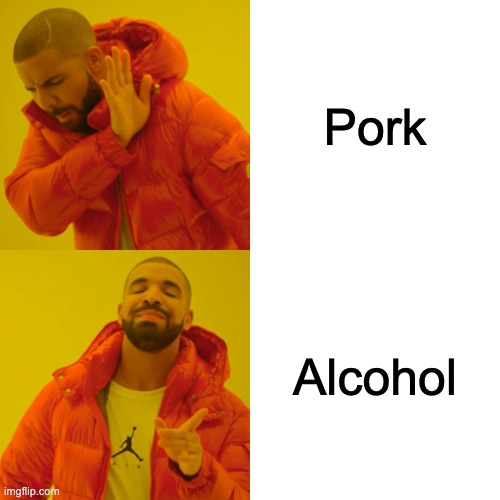The Muslims Who Drink but Won’t Eat Pork
Why many of us grapple with an irresolute relationship with pork while happily drinking, partying, and engaging in other taboos.

College is when budding young adults dabble in new experiences, make mistakes, and metamorphose into new and improved versions of themselves. But before I moved to the US from Bangladesh for college, I was forewarned by my father that these opportunities for self-exploration were “Western luxuries,” which I knew was code for one thing: taboo. My father, a container ship captain by profession, traveled to every corner of the world while diligently performing his duties as a devout Muslim. Though he is at his core progressive, always urging my siblings and me to be “global citizens,” he still expected us to do exactly as he did — be “good” Muslims, regardless of where we are.
But my new reality in the US made me question those Islamic taboos and what being a “good” Muslim even really meant. Mildly intrigued by Hollywood portrayals of college life but mostly excited to make new friends, I leaned into the freshman parties. Surrounded by red solo cups, I rarely dealt with guilt or regret unless they came in the form of a painful hangover the next day. But I traversed the dining halls with caution, avoiding all the meat because I knew it wouldn’t be halal. Nevertheless, about two months into my first semester, I reached my limits for dry tilapia, bland vegetables, and sad salads and succumbed to a dining hall cheeseburger, guilt-free but equally unsatisfying. I confronted these taboos with relative ease, barely contemplating my actions or their repercussions at the gates of hell. But what did turn me into a puddle of anxiety was the thought of eating a slice of pepperoni pizza.

Like Tom Brady and Target, I saw pepperoni pizza as a deeply allusive mascot of American life. And as I had come to learn in college, turning it down often raised a few eyebrows. I clearly ate meat and didn’t suffer from celiac disease, so how could I resist the greasy goodness of a slice of pepperoni pizza? That shock turned to sheer confusion and honest curiosity when I’d explain to my peers, with a glass of wine in hand, that I couldn’t eat pepperoni pizza because pork is haram. “But Anikah, you drink alcohol, which is also haram, so why is pork such a big deal?” was the usual follow-up. Back then I didn’t have an eloquent response to this question. Instead, I simply said, “Alcohol is a social thing. Pork? Not so much.” In hindsight, this was both a defensive justification to others and an attempt to exonerate my own conscience.
In retrospect, I didn’t just avoid pork; I held a deep-seated aversion to it. Pretty much all throughout college, I couldn’t bear the thought of eating pepperoni pizza or anything that might have come in contact with anything pork. A few years later, I resorted to arduously picking pieces of pepperoni off my slice in hopes of some respite from guilt. Soon after, I grew tired of skirting around pork and requested that my friends conveniently forget to share the details of the type of pizza we’d be ordering — ignorance is bliss, as they say. Today, I’ll eat a slice of pepperoni pizza without any trepidations, twisted rationale, or self-guided deceptions, although I personally almost never order a pork item off a menu unless it is for “research.”

Judging from the many memes and TikToks on the subject, I’m not alone in this vortex of righteous conundrum. Many young Muslims around the world are grappling with their irresolute relationship with pork while happily drinking, partying, and engaging in other taboos. This led me to wonder how others like myself navigate the implied degrees of Islamic taboos. More importantly, how and in what circumstances does a taboo cross over from being unacceptable to acceptable? Seeking both answers and solidarity in my moral quandary, I joined a global Facebook group called Misfit Muslims, which connected over 1,200 members wrestling with similar questions.
On the message board, I posed the same question that my friends had asked me in college. Within an hour, a flood of comments rushed in from over thirty different people expressing their thoughts and reasonings, and many more concurring and commiserating. Several comments addressed the main difference between mentions of pork and alcohol in the Quran. They explained that pork is specifically mentioned in the Quran as haram, whereas alcohol is only described as “makruh” — something “that might be good in some cases, but it could cause more harm so it’s best that you avoid it.” This was news to me — growing up I was taught that alcohol is strictly forbidden.
After spending some time in the depths of Google Scholar, I found that in several interpretations of the Quran, verses addressing alcohol displayed degrees of ambiguity. One translation said, “They ask you about wine and gambling. Say, ‘in them is great sin and [yet, some] benefit for people. But their sin is greater than their benefit.’” This made me wonder why alcohol was never taught as possibly makruh while I was growing up in Bangladesh. Though it may sound sacrilegious, I’ve long struggled with the language barrier when reading the Quran — a challenge that troubled me since childhood but one I was afraid to voice until now.
Unlike the Bible, which was spread across the world in globalized English, the Quran was written in Arabic, a language considered holy by Muslims everywhere but only institutionally taught in a few countries. From what I understand, in Bangladesh, only the Imams (Islamic scholars) are truly fluent in Arabic. When my peers and I were learning to read the Quran as kids, the emphasis was always on the pronunciation of our Arabic and how fast we could finish reading all 604 pages of the Holy Book. But rarely were we encouraged to actually understand what we were reading or to read it in a language we spoke. In fact, I have a vivid memory of being apprehended by my hujur (Quran teacher) for asking why we were not learning to read the Quran in Bangla or English. “Reading the Quran in Arabic is the highest form of sunnah (religious act),” he responded sternly. All this to say, we were told to believe that alcohol is bad with no way to inspect its possible makruh nature. Funnily enough, though, shellfish is considered makruh in Islam, but boy do we Bangladeshis love our shrimp.
My parents and community hammered in on how pork is dirty and that it causes diseases. I no longer believe in this ‘explanation,’ but the yucky feeling is still deeply internalized.
Another throughline I saw in the comments was that almost everyone overwhelmingly associated pork with a singular feeling — disgust. “I feel strongly about pork prohibition because of how it was ‘explained’ to me growing up,” wrote one commenter. “My parents and community hammered in on how pork is dirty and that it causes diseases. I no longer believe in this ‘explanation,’ but the yucky feeling is still deeply internalized.” Another said, “Even images of pork and pigs, no matter how cute or cartoonish, caused all of my family members to groan in disgust. Today, I don’t think pigs are gross, but I can’t help but flinch at the sight of pork. The repulsion is hardcore ingrained.” Interestingly, though, almost everyone who commented on my post mentioned that they did not associate alcohol with the same unyielding sense of disgust as pork.
In 1993, sociologists Gaye Tuchman and Harry Gene Levine published a fascinating study exploring Jewish taboos through an unexpected lens: the consumption of Chinese food, particularly pork and shrimp, among New York City’s Jewish elders, many of whom came to the US as Holocaust survivors. They wrote that “longstanding webs of significance set limits on what an immigrant or ethnic group can use to construct new collective activities and forms of identity.” Meaning, the socially and ideologically ingrained ick of pork, as seen in the comments on my post, is hard to let go of even though, scientifically, pigs are actually some of the cleanest animals around.
In Tuchman and Levine’s study, and my own albeit much less elaborate research, commensality (an academic term used to define eating together as not just an act of consumption but also a construction of identity) was key to how people navigate degrees of taboo. For many of New York City’s Jewish elders, it was the act of eating Chinese food on Christmas Eve specifically that made shrimp and pork momentarily acceptable — because it allowed them to create traditions as Jewish-Americans while simultaneously affirming their non-Christian identities.
Bacon is oddly special to me because the first time I had it was at Burning Man during the ceremonial sunrise bacon and pancakes breakfast.
For Ujala, one of the commenters who I spoke to at length over the phone, it was her time at Burning Man that made her fall in love with bacon. She immigrated to the US from Saudi Arabia as an adult and explained that she’s not necessarily a practicing Muslim anymore. When the topic of pork and alcohol arose, she admitted that she drank alcohol without much thought but is hesitant around pork. “I find it a little silly but difficult to explain why I still hold on to this aversion,” she said. But when it comes to bacon, Ujala happily dials down her disgust because she associates it with positive memories. “Bacon is oddly special to me because the first time I had it was at Burning Man during the ceremonial sunrise bacon and pancakes breakfast,” she said. She recalled feeling a level of love and acceptance at the festival that she hadn’t experienced before. “I don’t know if bacon itself is that delicious or that I felt so at home at Burning Man that it made me love bacon.”
From Ujala's Burning Man bacon to my pepperoni dilemma and the conversations on Misfit Muslims, it’s clear that young Muslims globally view religious taboos on a sliding scale of acceptability. Some taboos like alcohol, a tempting forbidden fruit, can move through the spectrum effortlessly, while pork, indoctrinated as disgusting, requires years of unlearning and rigorous moral realignment. But in this realignment, our identities as Muslims are often questioned not just by our own communities but also by the rest of the world.
At 30, I’ve finally detached my idea of religious virtue from what I eat and drink. Does that compromise my integrity as a Muslim? My parents might think so if they ever find out I love a mezcal martini (they still don’t know that I drink). Or that when it comes to chorizo or carnitas, I do on occasion indulge in what they would consider moral turpitude. I am, however, cautious about food waste and eating with our planet’s future in mind. I’ve diligently paid my yearly zakat (mandatory annual donation to charity) all throughout adulthood. And I always aim to be a generally decent human being.
I know this counts as “good” Muslim behavior, but is it Muslim enough? What does it mean to be a “good” Muslim or a “real” Muslim, anyway? And more importantly: why do we constantly feel pressed to answer that question in the first place?




